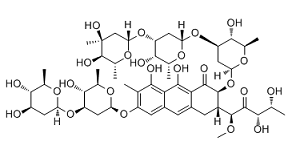All AbMole products are for research use only, cannot be used for human consumption.

Plicamycin binds to the minor groove of DNA at GC-rich sites, resulting in inhibition of RNA synthesis; this agent also inhibits mRNA expression, resulting in a reduction in protein synthesis. In addition, plicamycin may inhibit bone resorption by down regulating transcription of c-src, an oncogene involved in bone metabolism and resorption.
In vivo, the antitumorigenic activity of Plicamycin (0.2 mg/kg/day) is determined in a xenograft model and observed reduction in tumor volume and weight. No significant mouse body weight loss is observed in Plicamycin-treatment groups, indicating that Plicamycin-associated toxicity is minimal. Plicamycin also increases TUNEL-positive cells in tumor xenografts.
| Cell Experiment | |
|---|---|
| Cell lines | HEp-2 cells and KB cells |
| Preparation method | HEp-2 cells and KB cells are cultured in DMEM 100 U/mL each of Penicillin and Streptomycin and 10% FBS for HEp-2 cells and 5% FBS for KB in a humidified atmosphere containing 5% CO2 at 37°C. Equal numbers of cells are seeded and allowed to attach. At 50-60% confluence, cells are treated with DMSO or indicated concentrations of Plicamycin (50, 100, and 200 nM for HEp-2 cells; 20, 40, and 80 nM for KB cells). After treatment, 30 µL MTS solution is added to each well and cells are incubated for 2 h at 37°C. MTS solution is analyzed using a microplate reader at 490 nm and 690 nm. |
| Concentrations | 50, 100, and 200 nM for HEp-2 cells; 20, 40, and 80 nM for KB cells |
| Incubation time | - |
| Animal Experiment | |
|---|---|
| Animal models | Female nude mice |
| Formulation | - |
| Dosages | 0.2 mg/kg/day, three times per week for 29 days |
| Administration | i.p. |
| Molecular Weight | 1085.15 |
| Formula | C52H76O24 |
| CAS Number | 18378-89-7 |
| Solubility (25°C) | DMSO ≥ 80 mg/mL |
| Storage | Powder -20°C |
| Related DNA/RNA Synthesis Products |
|---|
| AV-153 free base
AV-153 free base is an antimutagenic. AV-153 free base intercalates to DNA in a single strand break and reduces DNA damage, stimulates DNA repair in human cells in vitro. AV-153 free base interacts with thymine and cytosine and has an influence on poly(ADP)ribosylation. |
| Deoxyribonucleic Acid (from Salmon sperm)
Deoxyribonucleic Acid (from Salmon sperm) can be used as a research reagent, widely used in molecular biology, pharmacology and other scientific research. |
| GSK4418959
GSK4418959 (IDE275) is a non-covalent, reversible, selective and orally active WRN helicase inhibitor. GSK4418959 inhibits ATPase and DNA unwinding functions in an ATP-competitive manner. |
| Dencatistat
Dencatistat (P115) is an inhibitor of Cytidine Triphosphate Synthase 1 (CTPS1) with an IC50 value of ≤ 0.1 μM. |
| Antipain dihydrochloride
Antipain dihydrochloride is a protease inhibitor. Antipain dihydrochloride inhibits N-methyl-N'-nitro-N-nitrosoguanidine (MNNG)-induced transformation and increases chromosomal aberrations. Antipain dihydrochloride also restricts uterine DNA synthesis and function in mice. |
All AbMole products are for research use only, cannot be used for human consumption or veterinary use. We do not provide products or services to individuals. Please comply with the intended use and do not use AbMole products for any other purpose.


Products are for research use only. Not for human use. We do not sell to patients.
© Copyright 2010-2024 AbMole BioScience. All Rights Reserved.
